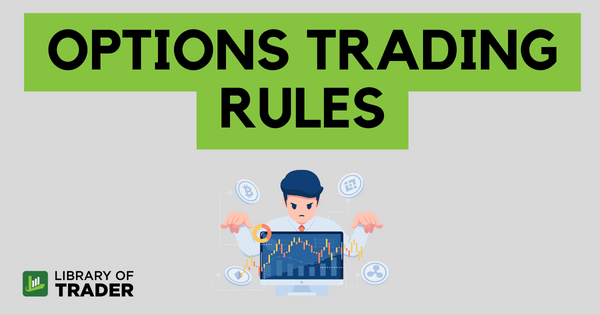Ask any trader and you might learn trading options is among the most difficult to trade profitably. As in everything else in life, only a tiny percentage of traders make consistent money. And in options trading, the chances of success for beginner options traders are even slimmer. But the greater the effort, the sweeter the reward. Learn the mistakes of failed traders and take their lost money home. That is how successful traders are born. With this blog, I will share with you options trading rules to help you start options trading right. Without these rules, you might fall into the same traps ex-traders did.

What Is Options Trading?
Options trading by themselves are not complicated to understand. Basically, options are a form of derivative contract that gives buyers of the contracts (the option holders) the right (but not the obligation) to buy or sell an underlying stock at a designated price at some point in the future.
Options can enhance an individual’s portfolio with added income, protection, and even leverage. Once used correctly, they provide traders with many advantages that trading stocks and ETFs alone cannot.
Options Trading Rules for Beginners
To start trading options, you will need to follow these four steps:
Open An Account
If you know the market well and have time to watch it, you are better suited to options trading than busy, beginner investors. To help you start options trading right, you ưhould go with a broker, a.k.a. an investing partner. With your information regarding investment objectives, trading experience, personal financial information, and the types of options you want to trade (calls, puts, or spreads), the broker typically assigns you an initial trading level based on the level of risk (typically 1 to 5, with 1 as the lowest risk and 5 as the highest), which is your key to placing certain types of options trades.
Determine Which Options To Buy Or Sell
There are two types of options: call option and put options.
- A call option is a contract giving you the right, but not the obligation, to buy a stock at a predetermined price (the strike price) within a certain time period.
- A put option is a contract giving you the right, but not the obligation, to sell shares at a stated price before the contract expires.
The type of options contract you might take on depends on which direction you expect the underlying stock to move:
- If the stock price is likely to move up: buy a call option, sell a put option.
- If the stock price is likely to stay stable: sell a call option or sell a put option.
- If the stock price is likely to go down: buy a put option, sell a call option.

Predict The Option Strike Price
To earn a profit in options trading, you’ll want to buy an option with a strike price that reflects where you predict the stock will be during the option’s lifetime. You can only hold the value of an option if the stock price closes the option’s expiration period “in the money.” That means either above or below the strike price. (above the strike for a call option and below the strike for a put option.)
Determine The Option Time Frame
You have to determine which styles of options to go with, American or European, to exercise the option. With the American style, you can exercise at any point up to the expiry date whereas the European style only allows you to exercise on the expiry day.
A longer expiration is often preferable as the option can retain time value, even if the stock trades below the strike price.
Options Trading Rules for Traders With Small Capital
Ideally, you want to have a minimum of $5,000 to start trading options. The smaller capital you start with, the more careful your strategies should be. To make the most of your initial investment, you should follow these rules:
Position Sizing
Avoid the common mistake that novice traders tend to make: conflating options and stocks. As options have a very short shelf life, all your capital might be gone in a few months. Instead of putting all your eggs in one basket and suffering a loss, you need to figure out how much capital to allocate for each trade.
Setting the Holding Period
You should always set a fixed maximum holding period to keep your chances of profiting off the trade safely. The main goal is to take part in breakout zones and move out of the trade fast. The ideal upper limit for the holding period is 3 days, but this comes down to intraday in the expiry week.

Pre-calculate Stops & Targets
You need to ensure your option trades are aligned with the stops and targets using forecasting tools and research such as online Option Calculators.
Avoid Popular Stocks In News
The trend is not necessarily friend with options traders as your concerns are more short-term which is largely determined by demand and supply intricacies rather than fundamental analysis factors.
Avoid Unknown Events
Trading should not be gambling, therefore, you should take only known and considered risks. Don’t go for events you don’t know very well, because you cannot predict how the market is going to react and might end up incurring heavy losses.
Limit The Number Of Open Trades
To control the total amount of capital you have invested and not overwhelm yourself, you should fix the number of open trades you are doing at once.
Conclusion
Options are more complex investments than stocks; therefore, they might not be an ideal choice for beginners. So traders without the experience or knowledge of how options work, and the risks involved, may want to first learn about options and options trading rules before taking up the profession. I hope the blog has shed some light on these topics and if you are looking for more knowledge, also check out the related blogs including


